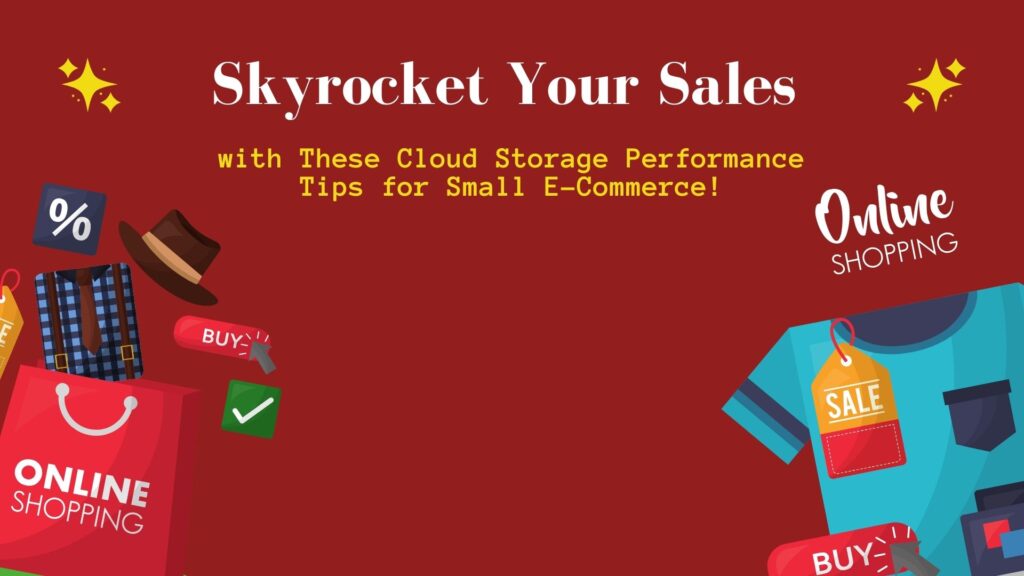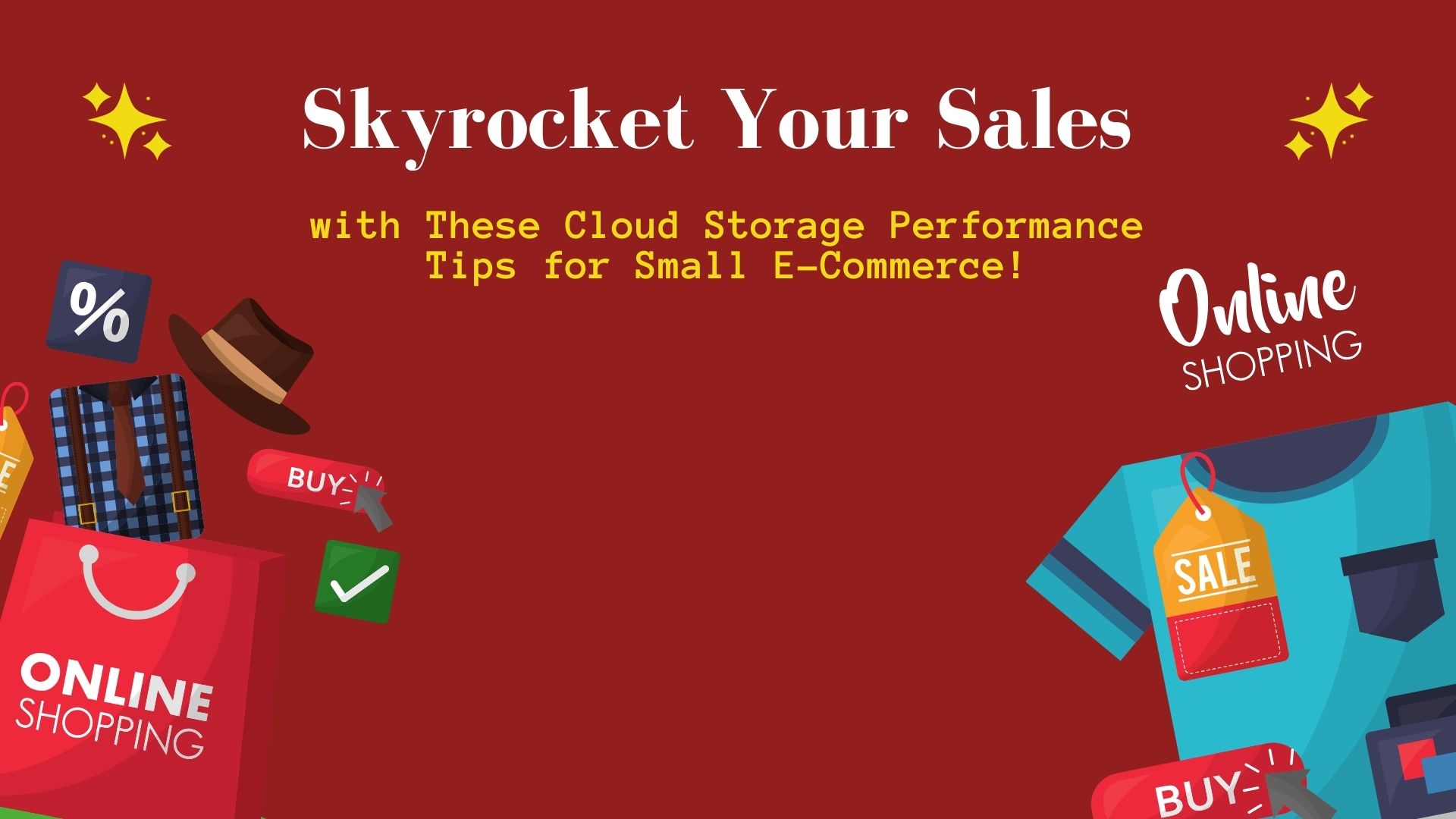In the competitive world of online retail, having a reliable cloud infrastructure is critical. Cloud storage performance tips for small e-commerce businesses can make all the difference in streamlining operations, improving site speed, and ultimately boosting sales.
As more shoppers take to online shopping, the demand for speed, seamlessness, and security has never been higher. Most of them would end up leaving their carts in case their websites load or data isn’t accessible or other similar issues pop up, moving on to competitors.

This is the time when small e-commerce owners should optimize their cloud storage if they want to stay ahead.
Much more goes into it other than the mere selection of a cloud provider; this particularly relates to tweaking the settings in your storage, updating your systems on a regular basis, and making sure that the solutions to your cloud are elastic to be able to handle periodic surges of traffic.
With the right enhancements to its performance, your site will run smoothly and users will have quick access to product listings, quicker checkout processes, and other great enhancements to the customer experience.
These are strategies that will help you reduce latency, improve scalability, and secure sensitive data-all issues related to small online retailers.
Whether you are setting up or upgrading your cloud, the following tips will help your customers enjoy a quicker and more reliable shopping experience that will tend to increase customer retention, hence increasing sales.
Stay tuned as we show how cloud storage optimization can really sky-rocket your e-commerce sales!
Top 6 Cloud Storage Performance Tips for Small E-Commerce
In this article, we are going to talk cloud storage performance tips for small e-commerce that will empower you with the right knowledge to boost your site’s performance and grow your business.
1. Reduce Latency with a Global CDN
One of the first few cloud storage performance tips for small e-commerce stores would be to reduce latency. Latency can be defined as the delay before data is actually transferred between the user’s device and your website’s server.
When this is reduced, there can be quite an effect on how it improves loading times to present seamless shopping experiences.
- Use a Content Delivery Network: A content delivery network is a network that keeps copies of your website data on servers scattered worldwide. When anyone accesses your site, this data will load from the closest server to the customer, hence reducing latency.
- Optimize for Different Regions: For an e-commerce business that involves customers across the world, a content delivery network becomes an important partner in dispensing fast service over distance.
- Monitor CDN Performance: Check your CDN periodic performance to ensure that it is at an efficient level. Slow CDN responses can have a reverse effect on the speed of your website.
2. Scalable Storage
The other very important cloud storage performance tip for small-scale e-commerce is that the storage solution needs to be scalable. As your business expands, so will the needs for data storage. Whether it is managing an increased number of product listings, handling surging traffic, or even higher numbers of transactions, your cloud storage needs to be in a position to scale your operations.
- Choose a cloud provider that auto-scales: several cloud providers will auto-scale for those times of huge surges in traffic, such as Black Friday and holidays. Regular Survey of Storage Needs: Perform regular audits to identify how much storage your business uses. This will help you plan for future growth and avoid paying for unnecessary storage space.
- Apply Elastic Load Balancing: It is a technology that will make it easier to distribute the traffic equally among several servers to avoid overloading any one server, which results in performance issues
3. Use Data Compression
Probably the best way to optimize cloud storage performance for e-commerce sites is data compression. The larger your website’s files, the longer it takes them to load, and somehow, this degrades the user experience.
- Compress Images and Videos: High-quality images and videos may be really important on e-commerce websites; however, they can make your website run slow. Use compression tools to reduce their file size without reducing the quality.
- Minification of CSS and JavaScript Files: This can be done by removing additional spaces and characters, hence making the size smaller and increasing page loading time.
- Use Content Compression Algorithm: Gzip or Brotli are some general compression methods that reduce file size during transfer from server to user’s device
4. Improve Data Security
Security goes hand in hand with building trust; any e-commerce has to have it at the top of the agenda, and thus enhancing security on cloud storage is an important cloud performance tip for small-scale e-commerce stores. Customers should be assured that their information, both personal and payment, is well protected.
- Employ Encryption: All sensitive information, whether sent or in rest, such as the payment details of customers or passwords, must be encrypted. Encryption makes sure that even when data is intercepted, it can’t be accessed or used by other people.
- Allow Two-Factor Authentication: A term used to identify any process where a user is forced to show two kinds of proof with the aim of authenticating themselves before being allowed access to the account.
- Perform Regular Updates: Keep your cloud infrastructure updated with recent security patches. Older versions of software might contain some vulnerabilities that will leave your e-commerce store open to cyberattacks.
5. Ongoing Performance Monitoring and Optimization
General performance tips for cloud storage in small e-commerce businesses include the following: regular monitoring and optimization. Performance monitoring enables the assessment of impending problems before they become real ones.
- Performance Monitoring Tools: Employing tools that help you monitor your site’s performance, whether it is page load time, whether there’s a rush of traffic, or how much storage you are using-Datadog, Google Analytics, New Relic-will go a long way in keeping your site up and running.
- Evict Unwanted Data: Delete unused or obsolete files stored in the cloud. The lesser the amount of data stored, the better the performance and cost-cutting.
- Optimize Database Queries: Inefficient database queries result in slowing down the site. Regular optimization and cleaning up of queries will keep them running smooth
6. Perform Data Backups Efficiently
Having a reliable backup system is one of the most important tips to help ensure cloud storage performance in small e-commerce businesses. There are times when data loss can result either from systems failures, from cyber-attacks, and sometimes even due to human error.
That is where you might not have any backup; the worst thing that may happen to your business is you losing business critical information.
- Schedule Automatic Backups: You can set up cloud storage to automatically back up some of the most vital files and data.
- Employ Redundancy for Critical Data: Backups stored at several locations offer insurance that your data will be safe should one backup fail.
- Test Your Backups Frequently: Make sure that your backups are working and you can restore quickly in an emergency.
Cloud Storage Performance Tips for Small E-commerce: Take Action Now!
If you want to really rocket your sales, now is the time to apply these cloud storage performance tips for e-commerce. You will be amplifying the speed, security, scalability, and reliability of your site.
All this will drastically improve the user experience while you will be building a resilient business for growth.
Now it’s time to act! Go through your current cloud storage setting and see how you can make it better, and apply the tips you have read in this article to get your e-commerce on full throttle.
For more information to order, please click this link.
The speedier, safer, and more expandable your cloud storage, the better will be your chance at driving sales.










